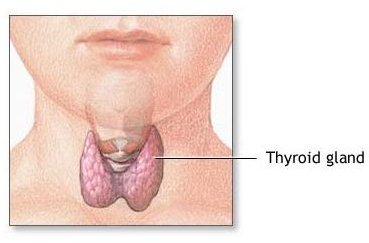Identifying Thyroid Cancer Symptoms Early for Increased Chances of Survival
The Thyroid
The thyroid is a butterfly shaped gland in the neck, located underneath the Adam’s apple. Its function is to release T3 and T4 hormones, which regulate the body’s metabolism. Usually, a healthy thyroid gland cannot be seen or felt by palpitating the neck. A swelling in a section of the thyroid–called a thyroid nodule–can be benign (non-cancerous) or malignant (cancerous). Benign thyroid nodules are common. For reasons unknown to the scientific community, there is a 50 percent chance that you will have a benign thyroid nodule by the time you are 50 years old, estimates WomensHealth.gov, a service provided by the U.S. Department of Health and Human Services, although, the majority of these nodules are so small that they are not noticeable to the people who have them.
Symptoms of Thyroid Cancer
Not every person with thyroid cancer will have symptoms, neither will every person who has thyroid cancer symptoms actually have thyroid cancer. A cold, cough, non-cancerous thyroid diseases or a benign thyroid nodule can mimic the signs of thyroid cancer. Although, a thyroid nodule can be a sign of cancer, less than 10 percent of thyroid nodules are cancerous, says WomensHealth.gov. Seek treatment from a doctor to rule out cancer or other diseases, if you have any of the following symptoms:
- A swelling in the front of your neck, underneath the Adam’s apple, that can be felt or seen.
- Swollen lymph nodes in the neck.
- Hoarseness in the throat.
- A change in the sound of your voice.
- Difficulty swallowing.
- Difficulty breathing.
- Persistent pain in the throat or neck.
Sinus problems such as a stuffy nose or a cough, swollen lymph nodes in the neck and throat hoarseness are quite likely due to a cold or cough virus. If the symptoms persist for more than two weeks or are accompanied by other thyroid cancer symptoms, see your doctor.
Risks of Thyroid Cancer
While anyone can get thyroid cancer, the medical community has identified the following factors that increase a person’s chances of developing the disease:
- You have received radiation therapy to your neck or head. Note: Standard diagnostic x-rays do not increase your chances of thyroid cancer.
- You have a family history of thyroid disease. Note: There are screening tests available to identify if you have genetic abnormalities associated with familial thyroid cancer.
- You are between the ages of 25 and 65 years old.
- You are a woman.
- You are of Asian descent.
Genetic Testing, Thyroid Tests, Biopsies and Thyroid Cancer Treatment
If you have thyroid cancer symptoms and your doctor suspects thyroid cancer or another thyroid disease, he may order laboratory tests or a biopsy to find a diagnosis. If tests show you have thyroid cancer, your doctor will recommend the appropriate treatment.
References
Cedars-Sinai: Thyroid Cancer - https://www.cedars-sinai.edu/Patients/Health-Conditions/Thyroid-Cancer.aspx
WomensHealth.gov: Thyroid Disease - https://www.womenshealth.gov/faq/thyroid-disease.cfm
MedlinePlus: Thyroid Cancer - https://www.nlm.nih.gov/medlineplus/thyroidcancer.html
American Cancer Society: Thyroid Cancer - https://www.cancer.org/Cancer/ThyroidCancer/DetailedGuide/thyroid-cancer-what-is-thyroid-cancer
Columbia University Medical Center: Thyroid Cancer - https://www.cumc.columbia.edu/dept/thyroid/risks.html
Image Credits
Thyroid Gland Image: PD-USGOV/Public Domain
